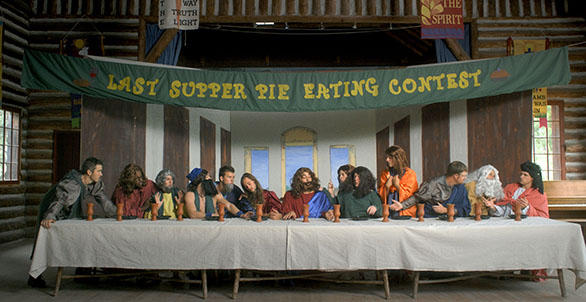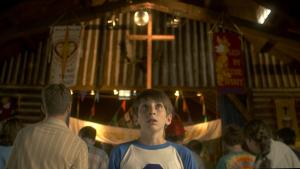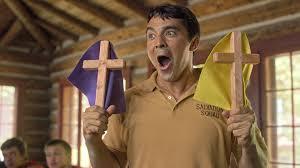
I am a product of Christian camp.
When I was a kid, one of the highlights of my summer was loading up my stuff in the church van and visiting Michigan’s Lake Ann Baptist Camp (I believe it’s now just called Lake Ann Camp because “Baptist” raise eyebrows). Like most summer camps, it provided an excuse for a week of bog walks, campfires, early crushes and launches from The Blob.
Because it was a Christian camp, it also means my summers were filled with distinctly faith-based weirdness. We played Capture the Flag, but it was themed to us being Chinese Christians trying to find our underground church before our counselors (pretending to be government officials) seized us. We didn’t sing “On Top of Old Smoky,” but rather songs from Psalty the Singing Songbook. Our campfires ended not with ghost stories but with a preacher telling us to imagine tossing our friends into the campfire and then grimly informing us that, if we didn’t tell them about Jesus, that’s basically what we were doing.
It was weird. It was uncomfortable. Viewed as an adult, it was problematic. But it was also my childhood and I remember it with fondness. I learned how to ride a horse, pulled pranks, played in the mud and mixed all my sodas together at the canteen. The fact that these memories are punctuated with a uniquely Christian brand of WTF-ery only makes them stand out more.
“Camp Manna” gets this. The debut film from co-writers and directors Eric Scott Johnson and Eric Machiela (read my interview with the duo) pulls no punches as it tweaks the peculiarities of Christian culture, but does it with a good nature that can only come from someone who’s grown up inside the faith. The film isn’t an angry “Jesus Camp” expose, but it’s also not “Kirk Cameron Goes to Camp” (Campfireproof?). It’s its own funny, charming thing and a promising start for these filmmakers.
Not a Christian film
In “Camp Manna,” Ian (Luke Klein) is sent to live with his Christian aunt and uncle after his parents die. Given the circumstances, he’s not eager to think much about God, and his mood isn’t helped by the home’s cheery evangelical vibe, complete with Jesus dashboard bobblehead and Sonseed’s “Jesus is My Friend” on constant repeat. Things don’t improve when Ian’s sent to Camp Manna, a Christian camp lorded over by PTSD-addled director (and possible war criminal) Jack “Cujo” Parrish (Gary Busey) and staffed by counselors Clayton (Jimmy Tatro, “American Vandal”) and Bradley (Evan Koons), who set their eyes on converting Ian. Clayton, in particular, gets an adrenaline rush from walking campers down the Romans Road; he keeps a collection of tattoos on his arm for every soul saved. Things don’t get much better when Ian meets his fellow campers, relegated to Bradley’s cabin and deemed the Passover Privates (come for the holy roasts, stay for the double entendres). They’re suspicious of the new unbeliever, and their focus is on winning the camp’s annual God Games, which feature such events as using a sling-shot to knock the head off a wooden Goliath and smuggling Bibles across an obstacle course.
In a typical faith-based film, Ian would make a dramatic conversion in the third act. There’d be a sinner’s prayer set to a Casting Crowns song and a tidy Bible lesson for audiences. It would be an evangelism tool to be played at youth group lock-ins, packaged with a devotional at Lifeway.
But “Camp Manna” isn’t a faith-based film. While largely inoffensive, it’s more likely to toss in sly jokes than play a CCM ballad. There’s not a conversion, but there is a pie-eating contest straight out of “Stand By Me.” And while there are changes of heart and themes of acceptance, the film is more reminiscent of “The Sandlot” and “Meatballs” than “God’s Not Dead” and “I Can Only Imagine.”
Plus, unlike other faith-based films, “Camp Manna” is good.
Holy subversion
Satire requires a deft hand and constant self-awareness. Everything from the writing to the performances to the cinematography must be on-point to navigate the ticky road between clever and broad, between witty and mean-spirited. Bad satire is excruciating. So when I heard that some independent filmmakers had made a satire of Christian camp, I readied myself for the worst, agreeing to watch out of curiosity and solidarity for fellow Michiganders.

I was relieved that, right out of the gate, “Camp Manna” looked like a movie. That might sound like faint praise, but it’s crucial. The mistake of many indie filmmakers is to just point and shoot, leaving cinematography or blocking for people with budgets. But “Camp Manna” has a sharp visual wit, and Brent Christy’s cinematography to gives the film an ‘80s vibe without nostalgic pandering. The gags revel in broad pokes at evangelicalism (a sign that says “Don’t let fear kill you; let Jesus help”) and clever Easter eggs (a sight gag involving Jesus-themed minigolf required me to pause the film because I was laughing so hard).
As I’ve written several times, I grew up in Christian culture, and its strange traditions, cultural appropriation and weird codewords fascinates me. I grew up so enmeshed in it that a good portion of my adulthood has been spent reconciling the faith I believe with the subculture around it. Johnson and Machiela seem fascinated too, and they write with the voice of insiders. They know the secret language of Christians — how every skit requires an altar call, our penchant for choosing cheery obliviousness to challenging truth, how people can geek out about any book of the Bible (even the genealogies) and how every song can be a praise song if you just know where to put the Jesus.
While the jokes are funny, the film never has the toxicity of, say, Bill Maher or Ricky Gervais. It’s more in the spirit of “The Simpsons” and Ned Flanders. Johnson and Machiela’s script never ridicules faith and instead centers the jokes on how beliefs are often expressed and lived out. It’s a laugh of recognition that acknowledges the surreal, often tacky aesthetics and phrasing of cultural Christianity, but it’s also nostalgic. It laughs at Christian music the same way kids of the ‘80s laugh at their love for the B-52s or Huey Lewis (and, let’s be honest, many of us still listen to our copy of “Sports.”) It’s affectionate satire, a laughing with instead of a laughing at.
We’re all weird
It helps that “Camp Manna” also has a cast adept at bringing both humor and heart. Klein has a gawky, vulnerable presence, at once intimidated by the new people around him and baffled at their strange traditions and language. He’s able to navigate Ian’s mournful spirit and the chip tragedy has placed on his shoulder without coming off overly angsty. He’s a good lead, and it’s strong work for a young actor with no prior credits.
Johnson and Machiela treat the campers as relatable outsiders. There’s not a ton of definition to them, although I really liked Gordo, played by Joey Morgan (“Scouts Guide to the Zombie Apocalypse”). Morgan’s got a funny presence, and it’s hinted at that he’s a bit too wise for Bradley and Cujo’s strangeness; he’s the sarcastic character who often walks away with movies like “The Mighty Ducks” or “The Sandlot.” The film could probably have benefited from giving the others more depth and not rushing through the God Games, but the film still manage to hit the misfit tone set by pretty much any ‘80s camp movie.
The bulk of the film’s humor comes from the camp leaders. Koons, in particular, goes all in as overeager Bradley. Koons, popular for his evangelical culture-skewering YouTube videos, has an abundance of energy and fills Bradley with over-the-top, overly sincere optimism; imagine “The Middle’s” Sue Heck as a camp counselor. But Koons also speaks Christianese with skill and is just as handy with a Jesus Juke as with a double entendre. The film wisely refuses to make him the bland Christian good guy, proven right in the end. Bradley has his own dark side and ulterior motives, which creates a well-rounded comedic character and keeps the film from succumbing to a cloying ending.
Tatro proved that he could mix obnoxious douchebaggery with vulnerability in Netflix’s delightful “American Vandal.” He’s very funny here, combining over-the-top teenage machismo with dunder-headed obliviousness. He’s the typical heavy; the cool counselor trying to scheme his way to victory. But in video diaries Clayton records, there’s also loneliness and sadness. When the coolest counselor at Christian camp goes back to public school, he’s known as … well, the Christian camp counselor.
Busey’s also fun and used in small doses, which is where he works best. He’s well-aware of his wide-eyed unpredictability, and understands the part he’s playing. Cujo, a camp counselor and former badass soldier, is supposed to be intense and wild, and Busey fits the film’s tone better than the directors’ original choice for the role, Chuck Norris, who likely would have been too placid wooden (also, I’m not sure how much of a sense of humor Chuck Norris has about himself). Busey has been in legitimate faith-based films before, but he also seems aware of “Camp Manna’s” intent. He’s having a blast rocking out and shooting paintballs, but he also is dialed into the film’s loopy humor. It might be his best performance in a very long time.
There are some minor missteps. The truth about Ian’s tragic background is a bit of out-of-left-field weirdness that doesn’t work, and the steady satirical hand drops away near the end as the film becomes a more traditional “underdogs-versus-the-snobs” competition formula. That’s fine, except the film has been so centered on the satire earlier that I don’t know that Ian’s relationship with his fellow campers really has a chance to gel, and the climax seems a bit perfunctory instead of engaging.
And yet, there’s also something refreshing about the film’s turn into formula. Most faith-based films end with a sermon, and too many satires want to end with a point. “Camp Manna” is content just to be a camp comedy in a wacky setting, and its unambitious plot means we can enjoy it without worrying too much about what it all means. The film doesn’t build to a lesson or spiritual epiphany; it simply says, “Aren’t Christians weird” before telling a story that asks: “Aren’t we all?
And can’t we have fun with that?”
Time for a conversation
 For such a prevalent subculture, there’s not a lot of satire about modern Christianity out there. I mentioned “The Simpsons,” and every now and then there’s the weird Christian character that pops up in different films and television shows. But there are very few films, TV shows and movies that tackle the absurdity of what people fueled by belief are capable of. Off the top of my head I can think of 1979’s “Life of Brian,” 1999’s “Dogma” and 2004’s “Saved!” (which the “Camp Manna” directors have name-checked and which I’ll have a revisit of next week).
For such a prevalent subculture, there’s not a lot of satire about modern Christianity out there. I mentioned “The Simpsons,” and every now and then there’s the weird Christian character that pops up in different films and television shows. But there are very few films, TV shows and movies that tackle the absurdity of what people fueled by belief are capable of. Off the top of my head I can think of 1979’s “Life of Brian,” 1999’s “Dogma” and 2004’s “Saved!” (which the “Camp Manna” directors have name-checked and which I’ll have a revisit of next week).
I think the tide might be shifting. Along with “Camp Manna” there’s the podcast “Good Christian Fun,” which raises an eyebrow at Christian music and movies (and, while we’re on hiatus until mid-July, CROSS.CULTURE.CRITIC. is going to head deeper down the evangelical culture well when we return). I think we’re going to see a rise in these looks at Christianity.
The presence of “Camp Manna” and “Good Christian Fun” is proof that I’m not the only one there who came of age in the middle of evangelical culture and is now trying to process it. And it’s not just an economic opportunity. Like I said, I’ve spent much of my adulthood trying to reconcile my beliefs with these practices and cultural traditions. At times, I’ve been hesitant to give them up because they’re so woven into my beliefs. And I think there are stories to be told of Christian community that are specific, moving and funny — and specificity in storytelling is often the key to universal truths.
But more than that, I think satire is needed. Evangelicalism is a dominant force in American politics and culture right now, and that’s not always a good thing. It’s led to some dangerous political precedents and has been responsible for a twisting and perverting of the Gospel. Satire is a great tool for speaking truth to power and shaking people out of their complacency. Maybe there’s room for some artistic deconstruction, where we examine the faith, hold it up to how we live it out and begin discussing what needs to be held onto, recovered or removed.
Or maybe, like “Camp Manna,” we just need more movies of friendship, unity and silliness.
Camp Manna is available for pre-buy on iTunes and releases on digital platforms June 5.












